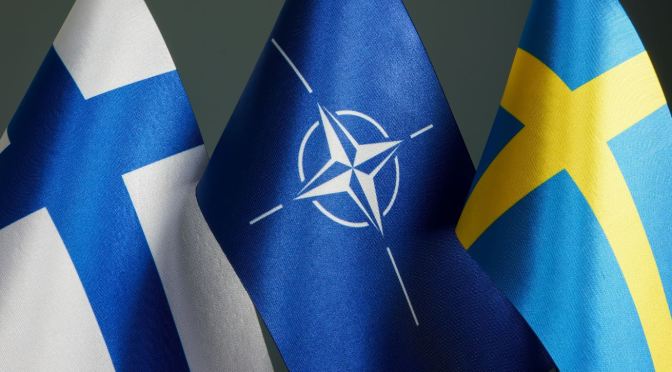Jari Kaivo-oja;
Political Stability and Absence of Violence and Terrorism in Finland and Sweden
In response to Russia’s invasion of Ukraine in February 2022, Sweden and Finland applied to join NATO but faced objections from Turkey, which joined in 1952. Alarmed by Russia’s violent invasion of Ukraine, a year ago, Finland and Sweden abandoned decades of nonalignment and applied together to join the Western alliance. NATO requires the unanimous approval of its 30 existing members to expand, and Turkey and Hungary have failed so far to ratify the accession of the Nordic neighbours (situation in 19.3.2023). Turkiey (or Turkey), a member of NATO, has developed a strong, diversified economy, but it has also experienced periods of political and civic turmoil between Islamists, and secularists and ongoing ethnic tension with Kurdish separatists.
Political leaders in Turkey have criticised Finland and Sweden for their weak counter-terrorism policies. We may ask whether there is any truth in these claims? The Worldwide Governance Indicators (WGI) project reports aggregate and individual governance indicators for over 200 countries and territories over the period 1996–2021, for six dimensions of governance: (1) Voice and Accountability, (2) Political Stability and Absence of Violence/Terrorism, (3) Government Effectiveness, (4) Regulatory Quality, (5) Rule of Law and (6) Control of Corruption.
I can use the indicator set produced by the World Bank (2023) as an indicator of Political Stability and Absence of Violence/Terrorism (PSAVT). In Figure 1 we can observe PSAVT Percentile Rank trend development of Finland and Sweden in the years 1996–2021.
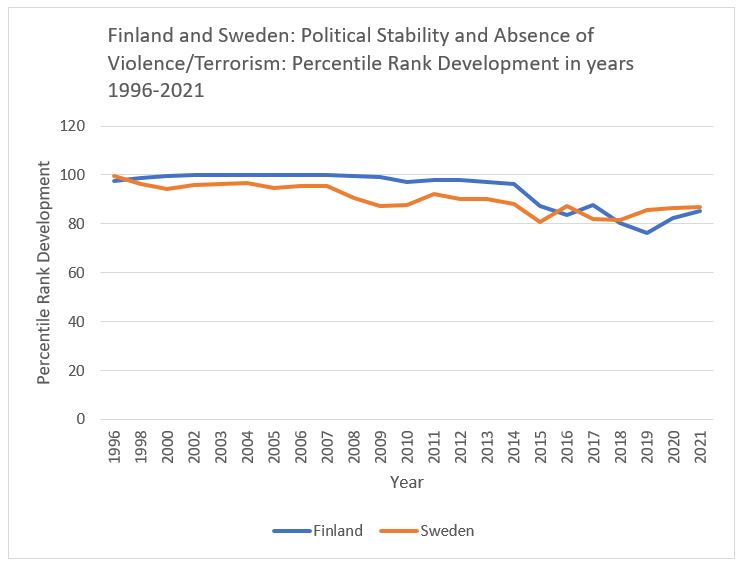
Figure 1. Finland and Sweden: Political Stability and Absence of Violence/Terrorism: Percentile Rank Development in years 1996–2021. Source: World Bank. Worldwide Governance Indicators (Statistics have been read 19.3.2023).
We note that in Finland and Sweden, the development of this PSAVT indicator has been at a high level, but it has weakened slightly since 2014. In this respect, Turkey’s concerns have not been entirely unfounded. Finland and Sweden have reason to reflect critically on the success of their security policies because the PSAVT indicator trends have indeed taken a turn for the worse.
Political Stability and Absence of Violence and Terrorism in Turkiye
Figure 2 shows the corresponding PSAVT indicator for stability and security developments in Turkiye. We can see that political stability and security developments in Turkiye have been at a very low level (below percentile 25 since 2006). Since 2006, the PSAVT trend in Turkiye has been decreasing although since 2016 it has slightly improved. From this point of security policy view, Turkiye’s concerns in this regard are quite understandable. Obviously, political leaders do not want the development to go in the same direction in Finland and Sweden. That is what they really have wanted to be absolutely convinced of.
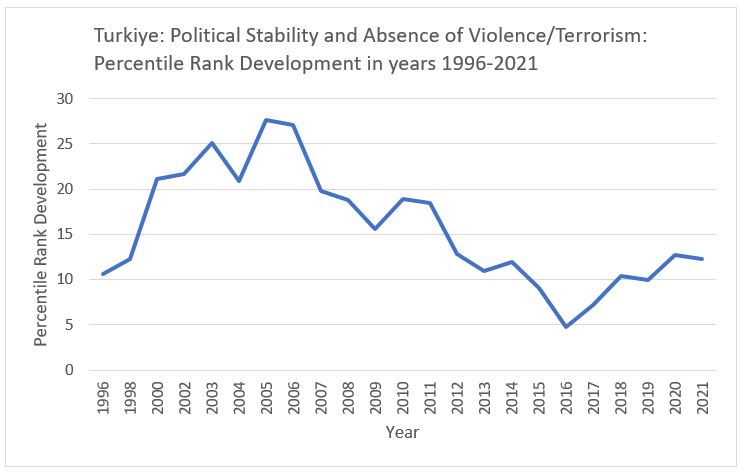
Figure 2. Turkiye: Political Stability and Absence of Violence/Terrorism: Percentile Rank Development in years 1996–2021. Source: World Bank. Worldwide Governance Indicators (Statistics have been read 19.3.2023).
We can also compare the average PSAVT indicator development of Finland and Sweden with that of Turkey and see the numerical development of the difference in PSAVT indicators. This trend comparison is reported in Figure 3, where we see the average PSAVT difference being around indicator units.
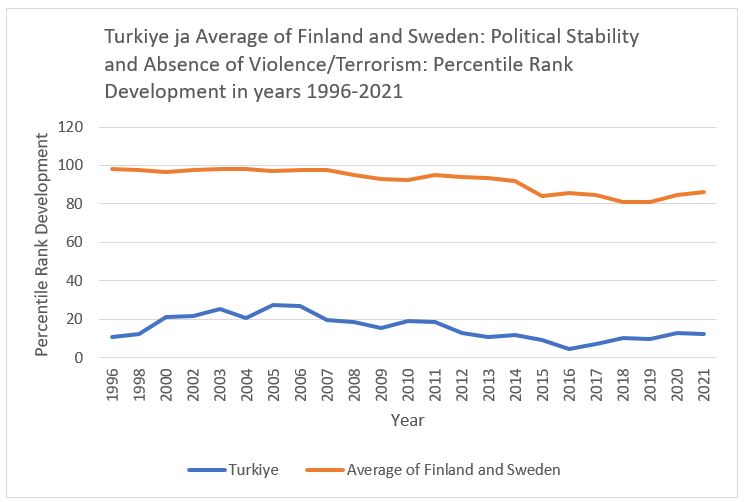
Figure 3. Turkiye ja the average of Finland and Sweden: Political Stability and Absence of Violence/Terrorism: Percentile Rank Development in years 1996–2021. Source: World Bank. Worldwide Governance Indicators (Statistics have been read 19.3.2023).
In Figure 4, we also separately report the difference between the indicators between 1996 and 2021. According to my calculations, the average difference has been 76.6 percentage rank points between 1996 and 2021. From this considerable PSAVT difference, we can conclude that Finland and Sweden will probably increase security in the NATO countries, and will not reduce it.
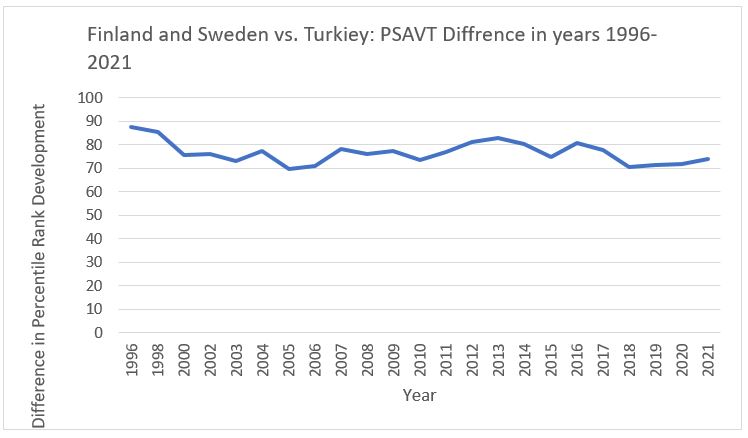
Figure 4. Finland and Sweden vs. Turkiey: PSAVT Diffrence in years 1996–2021. Source: World Bank. Worldwide Governance Indicators (Statistics have been read 19.3.2023).
A positive point for figure 4 is the observation that the PSAVT trend of difference (Finland and Sweden vs. Turkiey) has been downward-sloping trend.
In Figure 5, I have also reported the indicators concerning the regulatory quality and the level of the rule of law in Finland and Sweden. These worldwide governance trend analyses tell that these two important qualitative indicators of the quality of governance are at a high level in Finland and Sweden. In this respect, too, people in the NATO countries have no logical cause for big concern, if Finland and Sweden are accepted as full members of the NATO.
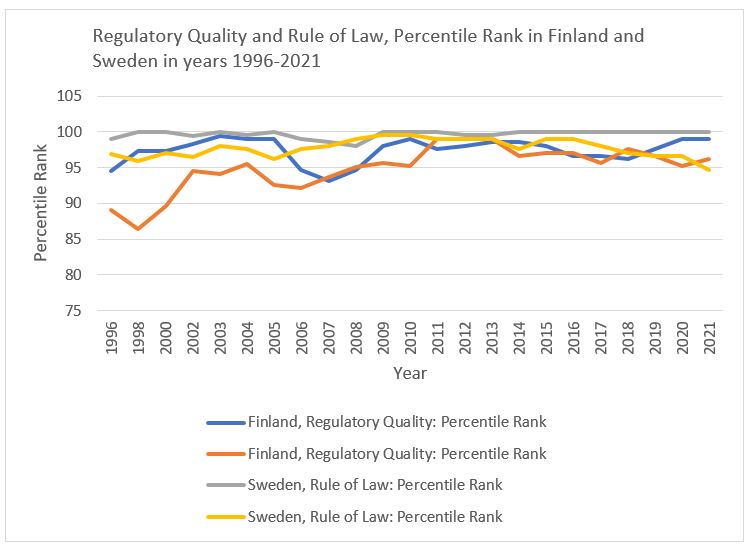
Figure 5. Regulatory Quality and Rule of Law, Percentile Rank in Finland and Sweden in years 1996–2021. Source: World Bank. Worldwide Governance Indicators (Statistics have been read 19.3.2023).
Today top experts like Halil Karaveli, a Senior Fellow with the Central Asia-Caucasus Institute & Silk Road Studies Program Joint Center, has noted in the Foreign Policy (Turkey’s Problem Isn’t Sweden. It’s the United States. – Foreign Policy) that “Turkey’s Problem Isn’t Sweden. It’s the United States”. President Recep Tayyip Erdoğan has focused on Stockholm’s stance toward Kurdish exile groups, but Turkiye’s real demand is the end of U.S. support for Kurds in Syria. Today and a long time ago, many political leaders in Turkiye have feared what will follow the de facto establishment in Syria of an autonomous Kurdish region, Rojava, controlled by affiliates of the PKK, which has been waging an insurgency against Ankara since 1984. The leaders in the United States, meanwhile, have opted to back the Kurds over Turkish objections, because the Kurdish militia was an ally against the Islamic State and remains a loyal U.S. asset in Syria after the defeat of that group (see The Myth of Erdogan’s Power – Foreign Policy).
If we look at worldwide governance indicators, it is relatively easy to accept these types of critical expert reviews. Turkiye clearly has both domestic and foreign policy reasons for discussing Finland’s and Sweden’s NATO memberships, even though Finland and Sweden are very worthy members of NATO.
The latest international news tells that Turkey’s President Recep Tayyip Erdogan says his government will move forward with ratifying Finland’s NATO application, paving the way for the country to join the military bloc ahead of Sweden. President Erdogan has suggested that his country may soon ratify Finland’s application to join NATO. Erdogan hints Turkey may ratify Finland’s NATO membership – ABC News (go.com).
Finally, it is to be hoped that both Finland and Sweden will be accepted as full NATO members, as these countries have a lot of high-level expertise in good governance, democracy, and security policy in relation to many other member states. We need to pay real attention to political stability and to the absence of violence and terrorism in the decision-making processes of international global politics.
Jari Kaivo-oja
Research Director, PhD, Finland Futures Research Centre, Turku School of Economics, University of Turku; Adjunct Professor (University of Helsinki and University of Lapland); Professor (Social sciences, Kazimiero Simonavičiaus University, Vilnius, Lithuania)
Background reading and references
Booth, Ken (2005) Critical Security Studies and World Politics. Boulder: Lynne Rienner Publishers.
Buzan, Barry (2007) People, States, and Fear: An Agenda for International Security Studies in the Post-Cold War Period. 2nd Edition. Colchester: ECPR Press.
Howard, Douglas Arthur (2001) The History of Turkey. The Greenwood Histories of Modern Nations: Westport, Connecticut, and London: Greenwood Publishing Group.
Peoples, Columba & Vaughan-Williams, Nick (2020) Critical Security Studies: An Introduction. 3rd Edition. London and New York: Routledge.
Sayle, Timothy Andrews (2019) Enduring Alliance: A History of NATO and the Postwar Global Order. Ithaca and London: Cornell University Press.
Waldman, Simon & Caliskan, Emre (2017) The New Turkey and Its Discontents. Oxford: Oxford University Press. World Bank. Worldwide Governance Indicators (19.3.2023). World Bank Database.
Photo: Shutterstock
